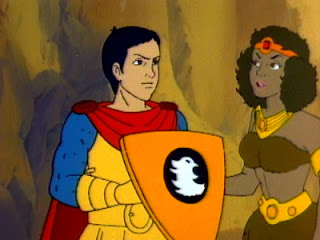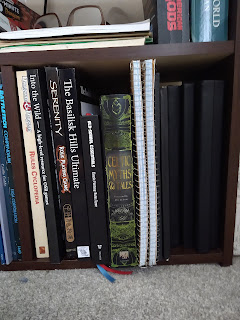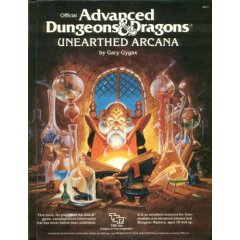Larry Hamilton's post about a short story, named "Call to March", and Reverend Fox shared a link about Myst. Clicking those links will get you MeWe, Larry's Blog, and Youtube.
A website dedicate to games of all favors and varieties, from video games to good old D&D.
Wednesday, April 13, 2022
Ghouls
Larry Hamilton's post about a short story, named "Call to March", and Reverend Fox shared a link about Myst. Clicking those links will get you MeWe, Larry's Blog, and Youtube.
Sunday, April 10, 2022
Hop, Skip and Jump Over the Shelf
Time isn't just flying, it's hopping, skipping, and jumping. If you look at the time to the right, three days came off this morning as our scheduled move-in date changed for the better.
This morning, I began prepping some of my games for transport. But before I did that, I took a shelfie to share:
You can't really see what's there, so I will describe some of it. On the front, left edge of the shelf are my lucky orange dice plus my Dollar Store dice. Next to that are three more important things, my watch, my glucometer, and a copy of The Prophet by Kahlil Gibran. The Prophet is the first book I bought for my wife on our first date. It was the first book I ever read aloud to her and the first book she purchased for me after the fire.
(Editorial commentary: After the fire, we discovered that my wife had a copy of the Bible in her glovebox and I had a copy of "What is Dungeons and Dragons?" in mine. After the fire, we each a copy of the Bible and "What is Dungeons and Dragons?" in our cars. Just covering the bases, you can't be too prepared.)
On the next shelf are tools: flash drives, a Chromebook and bookmarks. I'll skip the third shelf for now and move to the fourth, pictured to the left.
These are some classic books that I am sure everyone will recognize. Clearly, I love old-school AD&D, Star Frontiers, Battletech, and Star Wars. I have a few other interesting books there, too.Tuesday, April 5, 2022
How Ability Rolls Came to My Table
 |
| Even dusty old thieves are cool. |
In my last post, I talked about table trouble. This one could have been called "Theif Envy", but the concepts are one and the same and tie back to OSE.
I used to alternate between D&D and Star Frontiers campaigns (links go to DriveThruRPG). The idea of rolling against a skill is baked into Star Frontiers but is an add-on to D&D. Thieves have an array of skills that no one else has. Sure races have percentage skills for detecting doors and sloped passages, but a dwarven Thief character is like no other.
It makes other class players envy those skills.
Now I actually remember when the idea of rolling for certain actions came to my table. The party was at the last door in the dungeon and had plenty of warnings that the exit door would be trapped. The Thief took the lead and easily detected the dart trap in the oversized, dragon-shaped door handle. Then THE PLAYER got cocky.
"I'll detect for poison!" he shouted.
"You found some!" I shouted back.
It was too good to pass up. I made him roll against his constitution score. He failed and was paralyzed. The party escaped, dragging the butt hurt Thief behind them, but as they closed the door on the dungeon, I could not close the door on "ability rolls".
Oh, man. What a can of worms. Not because it's hard, but because it's so easy. Like being pelted with dice.
 |
| Perversion is too many die rolls in a role-playing game. |
"I'll roll for this..."
"And I'll roll for that..."
The one thing that could have stopped this from happening was a simple and clear acknowledgment of the player's humor vs. the character's intent. There was no way that character was that stupid. Or funny for that matter. Every other social encounter this character and player had was decidedly taciturn or even sour.
I shouldn't have let it happen, but I happen to like this style of play... To a degree.
If a character needs to do something that can be described easily and doesn't invoke any sort of fantastic ability, the die roll itself is suspect. As much as some people can be funny like the aforementioned thief, some people's reactions to situations can be just as good.
When the player of the Fighter hears a threat from an opponent and puts on their game face, the perfect, bone-crushing game face, he or she shouldn't roll for anything. They are not intimidated and perhaps turnabout happens where the mouthy NPC has all of his buddies fail a morale check right from the start, leaving the Fighter and the Mouth to work it out.
You see how that's different, right? A morale check is hardcoded into the rules. But an ability check isn't. What would I have a Fighter roll against for bone-crushing aggressiveness?
No idea.
In all cases, I believe the characters should be able to do whatever they want when they want. It might not work out, but you know, I let them try. Unless someone proposes a task that maps directly to an ability score, I don't want the roll.
A trivial example is leaping on or off horses. I'm not rolling for that because 99.99999% of the time, the action is merely flashy and not necessary. The times when it's necessary, eating a face full of dirt is better than what would happen.
A not-so-trivial example is when the party or player comes up with the perfect plan, one that seems to have no flaws or problems and is delivered with confidence and flair? So long as all of their assumptions are correct, what is a roll going to do to improve the situation?
Nothing at all.
I can give a hysterical example of not rolling. I had a Magic User with a fly spell that he used all of the time. He got his hands on a ring of delusion, which he believed was a ring of flying.
"Oh, shit," muttered the rest of the party.
In talking this out with the DM, we decided that it was really a ring of double delusion. Not only did my character believe it was a ring of flying he would also be deluded into forgetting that he cast a fly spell to make it work. So the ring appeared to be a ring of inconsistent flying.
This was preferable to making a saving throw against the ring's influence. We kept track with a token, when I cast my one and only fly spell or invoked the ring's power, I handed over the token to the DM. Without the token, any attempt to fly would fail, usually with disastrous results.
My character would suggest ariel solutions to every problem even if it wasn't reasonable to fly at all. Again, this is a ring of delusion after all.
In Old School Essentials, you generally have a 1 or 2 in 6 chance of pulling some random activity for a skill that isn't quantified. That's a great compromise because usually, these events don't map at all to a skill.
Sunday, March 20, 2022
AD&D e1, Dealing with Trouble at the Table - Part 1
 |
| Today, we go behind the curtain on my style of play. |
Needless to say, a lot of trouble popped up at the table due to a large number of players. The obvious and primary problem was attendance. My way of dealing with this was not to run dungeons all the time and encourage the party to exit a dungeon whenever possible. That at least opened the possibility of missing players' characters being left behind in a place of safety. It didn't always work out, but it significantly reduced the possibility of myself or someone else running an extra character. Wilderness and town settings are best for depositing a PC in a safe place.
My "solution" was less than ideal. I would run the character in the background as an NPC and adjusted threats accordingly. It was rarely a good idea, but its what I did.
The next major issue was the introduction of Unearthed Arcana to our campaign. I personally love the book, but I can count on one hand the number of times someone decided to be a Barbarian, Cavalier, or Theif-Acrobat. My players were far more interested in the new racial subtypes, spells, and weapons that were never a problem. The details in this tome are far more helpful than the mechanical changes.One thing I flat-out ignored was Fighter, Ranger, or Paladin as a subtype of Cavalier. No character class was a subtype of any other class in my campaigns. What helped in this regard is that I used to play B/X and let players use B/X characters in AD&D. You could be an Elf, a Fighter who was an elf, or whatever else was described in either set of rules. B/X characters tend to have lower stats, but when you're the DM who imposed the rule, you know that already and adjust accordingly.
Cavaliers have so many new mechanics that are horrible for gameplay. Abilities or new mechanics based on alignment suck because that is the domain of Paladins or Assassins. It is too wild and inconsistent for players to remember. Starting at level 0 for one specific class is stupid. Tacking on a paragraph to the Cantrip descriptions kind of implies that Magic-Users and maybe Illusionists also start at level 0.
Why not every character? Because it's stupid and adds nothing. Just weaken the party with a disease at level one if you want that. Worse, this book also lead to the idea that Magic-Users might have had three levels of level 0. It wasn't all that clear.
What the hell? All I wanted from this book was to have Eric, Bobby, and Diana from the cartoon, not a tax audit form and root canal.
To get around this, I completely eliminated the concept of level zero. In discussing this with the players, they all wanted that little bit of padding for their Hit Points at level 1. Ok, sure. What I wanted was a simple ruleset and a Cavalier that behaved more like a non-lawful good Paladin.
I created a collection of "professional classes" which imparted a backstory, a field of special knowledge, and 1d6 HP to any player character class. There was also a slight chance that someone received a +1 with a tool-like weapon or the ability to wield a different type of weapon in lieu of a single weapon normally assigned by the main character class description. For example, a mason-turned Cleric received a +1 to hit with a hammer or a hunter-turned Magic-User knew how to use a lasso or perhaps a light spear instead of a quarterstaff.
I even wrote a book about it called Zero to Hero: Uncommon Commoners. The "Zero" in the title secretly refers to my "no zero-level characters" edict. This is a trivia-like spoiler. No place in this title do I suggest to the reader not to use zero-level characters. Since I want to rewrite this book, you might want to wait to download it.
My campaigns tended to be high magic, so tacking on a few extra HP to every character did nothing special, except weaken spell casters. The deal for spell casters was also more power, I permitted first-level characters access to their bonus spells right out of the gate. In my campaigns, a super wise Cleric could unleash an extra, higher-level spell at first level. I also used the same chart for Magic-Users, Illusionists, and Druids.
Who cares?
I gave every PC Fighting man an extra 1d6 HP. Let the power rush to everyone's head while guiding the squishy magic-using types away from florentine style dagger fights which ends them so quickly.
One tale of woe stands out in my head. A case of pigheadedly ignoring mechanics. A player was having a difficult real-life and decided to burden me with his troubles by lashing out with a Paladin that wouldn't stick to his alignment. The rule on this is pretty simple. The Paladin loses their abilities and some experience until they conform to the class requirements or changes class and/or alignment.
The reason for this rule is simple, to prevent mechanical abuse.
As you can see, I play pretty fast and loose with mechanics anyway. I couldn't let the abuse continue but I didn't feel like removing powers from someone who was already suffering from a real-life loss. It was the wrong answer.
When the first couple of abuses happened, I merely told the player that his character felt different about his chosen class. I didn't have an instant solution on the spot. When it happened in the next session, I addressed it in the same way. By the third session of abuse, I was ready to unload on him.
And boy, did I.
Instead of striping the Paladin of their powers, I assigned him an invisible angel NPC. Only his character
 |
| Cavaliers are dicks... and awesome. |
At first, I dealt with things by having him read sections of the gamebooks. Deities and Demigods - about his chosen god in particular. This seemed to reduce the amount of abuse by a good bit. Rather than engaging me in a challenging fashion, he was engaging with an NPC who operated under very strange rules that he didn't know. It's hard to violate rules you don't know.
One huge problem was when the Paladin lost his warhorse. It was shot right out from under him and died. The hostile behaviors came right back until the player realized I already had a plan for this possibility. Initially, I provided a regular horse and a few strange, mystical events to set the player back and stand the character back up for the win. A Paladin without a steed is at a disadvantage. The rest of the party either had to accept these mystical events or guard him against himself.
At various points, a stag, a dog, a cat appeared to assist him when needed. The angel confirmed that this was his God softening the blow and putting him on the right course to find a new warhorse.
Amusingly, the player tried to suss out the exact rules I was using for providing animal guardians. He entered a cattle pen during combat, only to have the angel proclaim:
"These are normal cows, son. This isn't how we should end."
Ironically, the warhorse problem resolved itself when the Paladin had it resurrected via a wish spell meant to rescue a different party member. Amazingly, the Paladin wrote out a wish that fulfilled both issues, that was also not abusive and seemed very sincere. As a Paladian would, the player ascribed the wish to his diety and pleaded for his horse and teammate's lives.
Some of these ideas I cribbed from Infocom games. Not the details, but the humorous tone the games used to get the player off the wrong track. Other times they inspired spur-of-the-moment gambits. More than a few scenarios came from fantasy novels, like the Damiano series. But the best one was preplanned from the get-go of deciding how to deal with this troublesome player.
For example, lot of people play AD&D with the idea players don't die at 0 HP, they slowly fall to -10 before expiring. I decided to mess with this idea. When the Paladin, who already had a lot of HP to begin with, dropped to 9 or fewer hit points, his guardian angel intervened. The angel would envelop the Paladin with his wings and at the end of the round, would physically merge with him. The Paladin would have access to flight and two flaming scimitars, but his hit points were still at 9 or less and dropping one point per round like a character at 0 HP.
Tick-tick-tick...
It took a year for this eventuality to happen. That's 52 weekly sessions where I needed "A PLAN". Real-life losses hang around for a good bit, so having "A PLAN" for the table is helpful. Hopefully, it doesn't involve kicking someone out of the game.
(Although, that can be a plan, too. You should approach this like ending a marriage, with or without children. Because other players may act like children. Don't do it lightly. )
After dozens of sessions, most of the party realized that there was something strange about the situation. When the angel finally revealed itself, the party cheered. There were half a dozen mock, "I knew it!" exclamations and applause. They really enjoyed the reveal.
The important bit here is creating a bit of mystery and investment for the other people at the table. Otherwise, it smacks favoritism and Mary-Sue'ing. One portion of this was explaining the mechanic, not the consequences of the mechanic.
No one, not even the Paladin's player knew what would happen if the combat lasted long enough for him to drop to 0 HP. I didn't state what would happen so as to drag the party into the event. They all needed the combat to end in less than 9 rounds. I didn't say that, but that's how life works. I honestly had no idea what would happen and luckily, the party rose to the challenge and now we'll never know.
While I loved the experience of dealing with this troublesome player in a creative way, I only wish to bring the inspired magic (and maybe an invisible angel) back to my table. Troublesome players are often not fun.
Jeeze. I didn't mean to burn through 2000 words on one tale of table trouble. I have appended the words, "Part 1" to this title as I can see I will be back to discuss other problems another day.
Friday, March 18, 2022
Five Point Friday - March 18th, 2022
This isn't much of a Five Point Friday, at least with respect to gaming.
A lot has happened this week. I started a new job on Monday. The massive increase in activity has kicked my ass. My blood sugar readings are all over the place but trending positively. Despite the exhaustion, I feel great.
I guess I'll start point one. I love John and Hannah's Red Dice Diaries. I've been plowing through them at half speed. For every episode I listen to, they upload 2. I loved the episode about stat'ing up NPC and Old Books.
Point 2. I wish to revisit my DriveThruRPG offering, Zero to Hero: Uncommon Commoners. I want to add a few more professions, sample character sheets with drawings of the character, a couple of charts for random NPC encounters. One of the things I would like to do is create a map for location in my campaigns, The High Booth. It's a church/temple/bar where extraordinary things happen and a great place to meet NPCs. Obviously, readers would be welcome to adapt or replace it with their own meeting place for NPCs. This addition would go hand in hand with charts of who one might meet in a similar establishment.
Point 3. I'd like to read for an hour or so each night. I did pick up a copy of three Thieves' World books a few weeks ago and it has sat untouched. That bothers me. Good books are there to be enjoyed. As I get my feet under me at work, I probably get the time.
Point 4. The house is coming along nicely. This weekend, I need to pick up a pool table, drawer pulls, and handles.
We are waiting on countertops and such. As you can see, the dog is a little nervous visiting "home", the place that burned. As we all are. Anyway, we had a great day when the appliances were delivered.

The image to the left is from DriveThruRPG's app and even old titles look amazing. I'm not sure if I can read them without glasses, but I can't read much without glasses anyway.
This little device is amazing and I hope to do a review on it soon.
Since I have been alternating between dropping hints of reviews and flat out telling you what I'll be reviewing, let me share this image:









